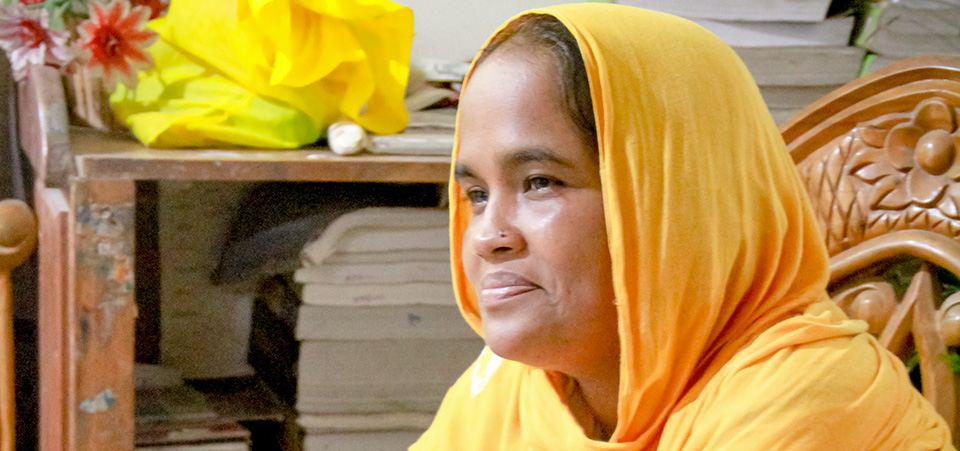From where I stand: “I did not give up... If they had delayed for 30 more minutes, it would not have been possible to save both lives.”
Kulsuma Begum, 32, is Secretary of Dokhin Marapara Mahila Bittohin Samabya Samity (South Murapa Underprivileged Women’s Cooperative Society), a civil society organization that is supported by UN Women and helps women in Teknaf, in Cox’s Bazar district of Bangladesh.Date:
Author: Samara Mortada

At the age of 14, I was forcibly married. After two years of facing domestic violence, I left home when my husband got married again, and I started my life all over again.
I got trained in first aid to support women affected by disasters, particularly pregnant women. And I spread my new-found knowledge at the community level, particularly on health care, but also what I learned about women’s empowerment, gender equality and child marriage. As a master trainer, I took the initiative to form many women-based groups in the community aimed at women’s well-being and economic empowerment. I then formed my own organization. It has been 10 years that I have been the chairperson of the organization called Dokhin Murapara Mahila Bittohin Samabya Samity, which has 60 members and an independent functioning body.
During Cyclone Mora in 2018, a registry of pregnant women was created. I met someone called Nurjahan, who was in the last stage of pregnancy and lived up on the hill near my home. One day I tried hard to connect with her over the phone but there was no signal. Wearing a volunteer’s uniform and rubber boots, I climbed up the hill and discovered a scene I have never witnessed before.
Nurjahan was lying down in a dark, soggy room surrounded by a few women from the neighbourhood and a midwife. She was frequently losing consciousness due to increasing maternal pain and high blood pressure. I informed everyone on the possible risks -- lack of oxygen, fall in blood pressure -- that might be risky for both the mother and newborn, and I suggested moving Nurjahan to the hospital immediately. The women around me said, ‘Why do you people always talk about going to the hospital! Were your 14 generations born at the hospital! You people always want to put women in embarrassing situations.’
I did not give up and finally succeeded in getting permission from Nurjahan’s in-laws to move her to the hospital. After a medical check-up, the doctor confirmed that if they had delayed for 30 more minutes, it might not have been possible to save both lives. Nurjahan gave birth to a baby boy and her family was grateful to me. If there had been a male volunteer instead of myself, we would never have gotten access to see Nurjahan on that day, as it would have gone against their religious values.”
Kulsuma won the Joyeeta Award, a government award that recognizes women, and received 100,000 BDT (USD 1,180) from the Prime Minister. And the Upazilla (sub-district) officer gave her the Joyeeta Begum Rokeya Award for contributing to social development.
Kulsuma’s organization is one of 63 women-led civil society organizations receiving training from UN Women’s National Resilience Programme and EmPower, which are focused on disaster risk reduction and climate adaptation and resilience. The organizations work in five of the country’s most vulnerable districts.
Kulsuma’s work supports United Nations Sustainable Development Goal 3, on Good Health and Well-being; Goal 5, on Gender Equality; and Goal 13, on Climate Action.